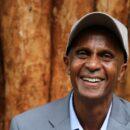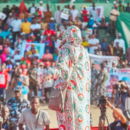Where Next for Darfur’s Peace Process?
Last weekend’s meeting in Arusha, Tanzania, of leaders of Darfur’s armed movements marked the re-launch of a serious peace process for Darfur. It’s Darfur’s first AU-UN hybrid operation, this time in the diplomatic sphere, and — given the constraints and the modest definition of "success" in the political world — so far it is doing well.
Step one was completed in Tripoli a month ago, when the two special envoys (Salim Ahmed Salim and Jan Eliasson) got formal agreement from the Libyans, Chadians and Eritreans to cooperate. There’s always a chance that one of these governments will play the role of spoiler, but there are good reasons to believe that they won’t, at least not for a while, and not so actively as in the past. Libya is a new friend to the U.S. in the region. The Chad government is encouraged by plans to station international troops close to its eastern frontier, and Eritrea is concerned that its role in training militants in Somalia is exposing it to U.S. wrath.
Step two was the Arusha meeting at which leaders from the non-signatory groups of the SLA, JEM and one Arab group agreed to present a common negotiating position at a new round of peace talks, which will probably begin in an African country in October.
The turnout for Arusha was unexpectedly good. Of the invitees, only two were absent. Abdel Wahid al Nur, the founding chairman of the SLM, remains in Paris, still insisting that he is the only legitimate leader of the movement. On his side are the facts that he is the Darfurian leader with the greatest name recognition and he commands the sympathies of many people, especially in the IDP camps. Working against him are his disorganization and lack of political and military structures, and the way in which he has staked his reputation among Darfurians on delivering an international intervention. Thus far, despite repeated murmurings that Abdel Wahid should be considered an obstacle to the peace process, the UN and AU have taken no steps against him. One rationale for this is that when UN troops arrive, Abdel Wahid won’t get the credit, and his support will begin to wither.
The other absentee was the SLM’s humanitarian coordinator, Suleiman Jamous, who is still interned in a UN hospital in Kadugli, Kordofan. But Jamous’s absence turned out to be a unifying factor, as all those present called for his release and participation, and the combination of a public campaign and diplomatic pressure appear to be leading towards his release.
Many others were not invited but have important stakes, including a JEM breakaway group, Arab leaders, and the unarmed leaders of Darfurians in the towns and camps. Their involvement is essential if the peace process is to enjoy legitimacy among Darfurians and if implementation is to proceed smoothly. The AU is working on mechanisms for engaging with these groups, consultations which could prove to be as important as the peace talks themselves.
More problematic are the substantive issues that must be put on the table the moment the negotiations begin. The movements’ leaders may agree—but on what? It is easy for them to reach consensus on an inflexible negotiating position in which their "fair and just" demands are put forward, not as an opening position, but as the only position they will accept. Thus, it is quite possible that the movements will unite on demanding an immediate single autonomous region for Darfur, an extended interim period in which they keep their armed forces, postponement of both national elections and self-determination for Southern Sudan, a return to historic land rights (hawakir), a big compensation fund, a vice president from Darfur, majority control of Darfur state assemblies and executives, and quotas for Darfurians in the civil service of up to 40%. Meanwhile the Sudan government is likely to respond, "we compromised in Abuja and these are even tougher demands—why should we reopen the DPA for renegotiation?" The Darfurians who signed the DPA—Minni Minawi and others—would be the strongest advocates for the status quo. If this were the case, we might then see a re-run of the last round of the Abuja talks—months of stalemate followed by frenzied activity as the deadline approaches, but with even less room for maneuver by the mediators.
The steps forward in Tripoli and Arusha should be welcomed. But Darfur’s history is littered with plans of action that never materialized. It is also a graveyard for theories of how to resolve conflicts and stop atrocities—simple ideas are always confounded by Sudan’s complicated realities. Fortunately, the key mediators have plenty of experience of the challenges of trying to bring peace to Darfur. They will need all their experience and even more patience.






Alex,
According to the BBC, Abdel Wahid al Nur refused to be party to talks in Tanzania without a ceasefire currently in place. Do you believe that is really all that is needed to pull al Nur into negotiations?
If the rebels who met in Tanzania brought Wahid al Nur to the table, what would his influence mean?
You stated that it is unlikely for the GoS to consent to whatever was agreed upon by the rebel leaders meeting in Tanzania. If Al Nur were to attend talks, do you believe he would make demands taking the rebels even farther from reaching common ground with the GoS?
Posted on behalf of Nimco Mahamud-Hassan
I had the misfortune of meeting Abdel Wahid al Nur at his home in Nairobi last year. He has been flattered by the attentions of the world community from George Bush to George Clooney. I remember him holding a letter from President Bush and spitting on his finger to see if he could smudge the signature to check whether Bush had actually signed it, as if it was a miraculous totem. Abdel Wahid needs to be brought down to earth.
Even if every single one of his demands is met he will most likely come with another one. There is no reward for him in having an agreement, because then he will need actually to prove his abilities as a politician and administrator and these qualities are completely absent in his character. When peace comes he will be tested and the people of Darfur will realise what Abdel Wahid is really capable of — or not.